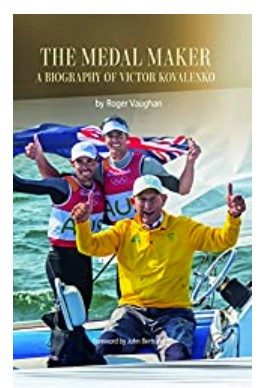Victor Kovalenko is arguably the most successful sailing coach in recent history. He was largely responsible for the improbable success of the Ukraine 470 sailing teams in the 1990s and the recent domination of 470 men’s sailing by the Australian team of Mat Belcher and Will Ryan.
Spurred by an article in Sailing Scuttlebutt we read The Medal Maker: A Biography of Victor Kovalenko, by Roger Vaughan. We were hoping to understand more about the world of high-level sailing. The book blends the principles of coaching and self-improvement with psychology, racing tips, and a recent history of world-level competition in the 470 class. We recommend the book to any racing sailor.
Brief Biography
Early Life
Victor was born in 1950 in Ukraine. The USSR was struggling with poverty under communism and the aftereffects of WWII. As a result, kids were on their own and became resourceful as a result. Victor was particularly curious and innovative. Drawn to water, he experimented with improvising sails for a small outboard motorboat.
The USSR had a focus on physical education. Trade unions, factories, and the state supported sports for all, including sailing. Good performance was rewarded with jobs and scholarships, with ample time to practice.
Sailing took over Victor’s life. In the Soviet military, he pushed hard to become a member of the Navy sailing team. A finger injury left him unable to sail. After rehabilitating the finger, he won the Flying Dutchman nationals in 1974. He then became a member of Soviet national team, training full time.
The 470
The 470 became his focus, since it was extremely tunable and allowed kinetics. He initially struggled due to the lack of opportunity for international competition but won the 470 nationals in 1981.
Victor could not form a top-notch team to keep competing in the 470 so he began to focus on coaching. He coached the Navy team and then was invited to coach a 470 women’s national team. His teams began winning medals for Ukraine.
The head coach of the Swiss team (Jim Young, from Oshkosh, WI) asked Victor to freelance coach. The Swiss team improved significantly, and his Ukraine teams did well at the 1996 games in Atlanta. However, after Ukraine’s success the team still struggled to get resources, leaving Victor frustrated.
He got an invitation from Australia to coach for the 2000 games and accepted it. His work with the Australian team culminated in his coaching of Mathew Belcher with Malcolm Page and then Will Ryan. Belcher and Ryan won an unprecedented 18 straight regattas.
Approach to Coaching
Victor’s approach is to break down the elements of sailing and help the sailor master each element. He organizes the elements into a table called the “magic box.” The five key categories are 1) basics (fitness, intelligence, and psychology), 2) boat speed, 3) starts, 4) tactics, and 5) strategy. He teaches sailors to think in terms of principles, which helps them broaden their understanding.
Determination and Psychology
Victor Kovalenko is known for his determination. His motto is that to achieve real glory takes all your time, all your money, and the best possible support system. His sailors train full-out in all conditions. They also use unique land drills. He continually fights for resources to support his sailors.
Regarded as a master of using psychology, his key principles include:
- Be positive. Say what is right. Correct with positive statements, not negatives: “Try this,” rather than “Don’t do that.”
- Avoid judgment; leave that to the athletes.
- Sailors must change their personalities to advance. They do this by facing hardships and overcoming them.
- Every setback is either a test, a warning, or a penalty. Take what you can learn and grow. Your first reaction is very important: deal with the situation and don’t waste time berating yourself.
- Overcoming hardships leads to discovering truth.
- Let the sailor be unique but help them uncomplicate things.
- Drip feed new concepts as they are ready.
- Give sailors the courage to take a risk and the wisdom to know when to stop.
Stories
Vaughan captures the unique challenges and paths to success for several of Victor’s sailors. These stories are worth reading to understand how striving for a goal forces the sailor to change, sometimes radically.
Related Content
Seven Reasons to Keep a Sailing Notebook – Victor keeps detailed notes. This article discusses why.
Racing Psychology Category – SailZing




